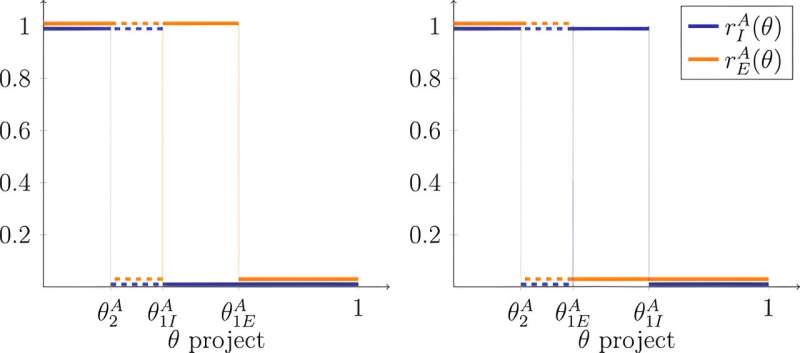This article has been reviewed according to Science X's editorial process and policies. Editors have highlighted the following attributes while ensuring the content's credibility:
fact-checked
trusted source
proofread
Anti-trust regulators should consider their options carefully when start-ups are acquired, new study suggests

Promoting a competitive marketplace has been the main focus for regulators concerned with "killer acquisitions"—when big companies swallow small startups to eliminate a potential rival.
But researchers and other observers point out that blocking these purchases puts something else important at risk—innovation. Startups are sometimes driven to come up with a new process or product precisely because they hope to be bought by a big player who will reward them handsomely for their work without having to bring it to market themselves.
"Banning these types of acquisitions may in turn lead to many startups not being there in the first place," points out Regina Seibel, an assistant professor of economics analysis and policy at the University of Toronto's Rotman School of Management.
That doesn't mean the acquisitions field should be left wide open. To find out when and how innovation might be stifled through antitrust measures, Prof. Seibel and two other researchers created mathematical models using game theory to test how innovation is affected under a host of scenarios.
The research was co-authored with Igor Letina of the University of Bern and the Center for Economic Policy Research, and Armin Schmutzler of the University of Zurich and the Center for Economic Policy Research. It is published in the journal International Economic Review.
It turns out that innovation may be depressed when acquisitions are banned because there is a lower variety of projects, they found. Besides discouraging startups who want to be bought, larger companies are motivated to duplicate their innovation, since they can't just buy it, instead of exclusively pursuing their own ideas.
But that's only in general. Looking at particular cases, innovation can be minimally or even not affected by a ban. If the startup doesn't have much bargaining power and won't significantly profit from a buyout, a ban can boost competition with a small impact on innovation.
The same goes for blocking a larger company from buying a smaller one so it can commercialize the startup's invention. If the creation is a potential blockbuster, the startup "can go on the market with very similar profits," compared to what it would reap from being bought, Prof. Seibel says. In this case, there may be even no impact on innovation whatsoever.
And while killer acquisitions have received more attention, letting these so-called "genuine" acquisitions to go ahead unfettered can be even more problematic from a competition perspective, because they can allow big companies to get bigger, crowding out the space for future startups.
In the real world though, it's tricky for regulators to know what's going on in an acquisition deal. That's why Prof. Seibel and her colleagues recommend regulators consider less blunt tools than outright bans. Taxing an acquisition reduces the profits that can be made by both sides "but it's less extreme than completely shutting the acquisition down," she says.
Subsidies can also be offered to startups who want to launch on the stock market, improving their profitability. "I think that's a very attractive way to go forward to foster innovation and also decrease the rate of these acquisitions," Prof. Seibel says.
More information: Igor Letina et al, Killer acquisitions and beyond: policy effects on innovation strategies, International Economic Review (2024). DOI: 10.1111/iere.12689
Provided by University of Toronto





















